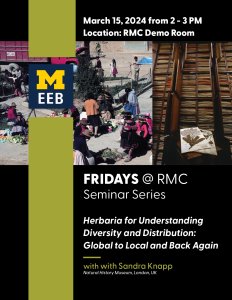Presented By: Ecology and Evolutionary Biology
EEB Friday Seminar at RMC - Herbaria for understanding diversity and distribution: global to local and back again
with Dr. Sandra Knapp, Natural History Museum, London, UK

More to come!
Preview: Herbaria are important repositories of plant diversity information, but the degree to which they are useful in addressing biodiversity loss in the here and now has been questioned. How can a dead organism pressed on a bit of paper be of any use in addressing an urgent societal challenge especially in the face of widespread habitat loss in the tropics? Most of the world’s tropical plant species are known from five or fewer digitally available herbarium specimens, with significant implications for all downstream analyses using species distribution data, including conservation assessments, biogeographic analyses, protected area planning, and taxonomic accounts. Digitized herbarium specimens, however, are biased. Specimens in large, historical herbaria in richer countries are much more likely to be databased, available online, and imaged and therefore verifiable. Many such herbaria have a long colonial legacy and in many cases the bulk of their collections are online but often have
been collected long ago. Conversely, specimens in smaller, local herbaria in poorer, tropical countries are much less likely to be available online but have usually been collected much more recently, however, specimens in local herbaria are much less likely to be included in downstream analyses, meaning local investigator’s contributions are less likely to be included, with potential impacts on their careers. Using datasets of Begonia and Solanum from Perú I will explore the disproportionate contribution of local herbaria and botanists to our knowledge of tropical plant distributions, and link this to the need for prioritization of these institutions for digital access and the importance of equity in science.
Preview: Herbaria are important repositories of plant diversity information, but the degree to which they are useful in addressing biodiversity loss in the here and now has been questioned. How can a dead organism pressed on a bit of paper be of any use in addressing an urgent societal challenge especially in the face of widespread habitat loss in the tropics? Most of the world’s tropical plant species are known from five or fewer digitally available herbarium specimens, with significant implications for all downstream analyses using species distribution data, including conservation assessments, biogeographic analyses, protected area planning, and taxonomic accounts. Digitized herbarium specimens, however, are biased. Specimens in large, historical herbaria in richer countries are much more likely to be databased, available online, and imaged and therefore verifiable. Many such herbaria have a long colonial legacy and in many cases the bulk of their collections are online but often have
been collected long ago. Conversely, specimens in smaller, local herbaria in poorer, tropical countries are much less likely to be available online but have usually been collected much more recently, however, specimens in local herbaria are much less likely to be included in downstream analyses, meaning local investigator’s contributions are less likely to be included, with potential impacts on their careers. Using datasets of Begonia and Solanum from Perú I will explore the disproportionate contribution of local herbaria and botanists to our knowledge of tropical plant distributions, and link this to the need for prioritization of these institutions for digital access and the importance of equity in science.